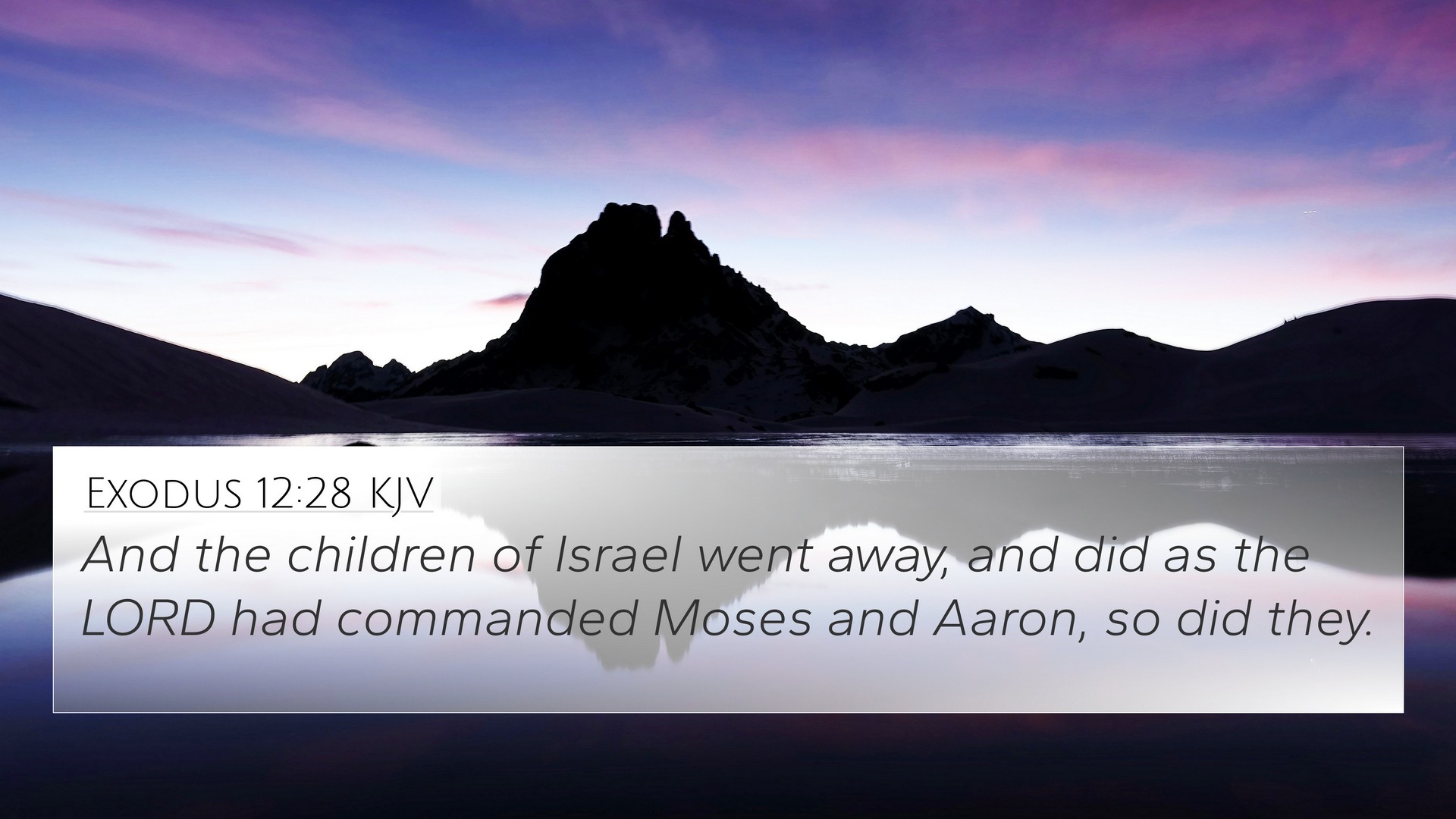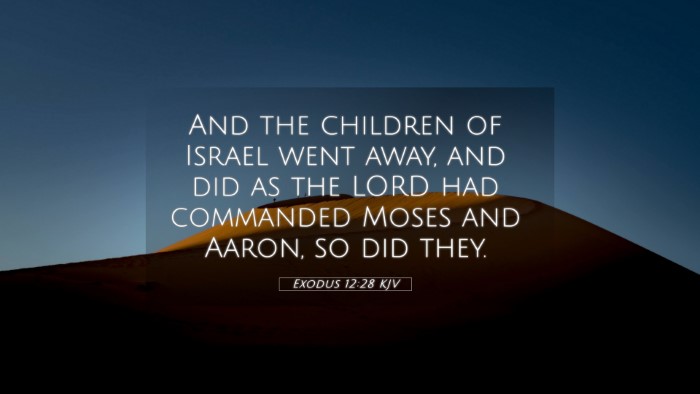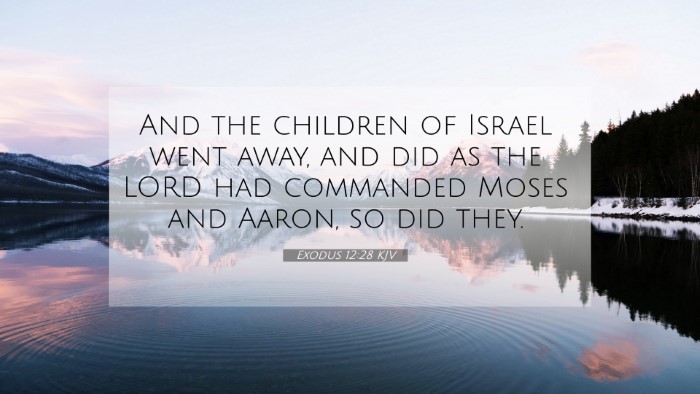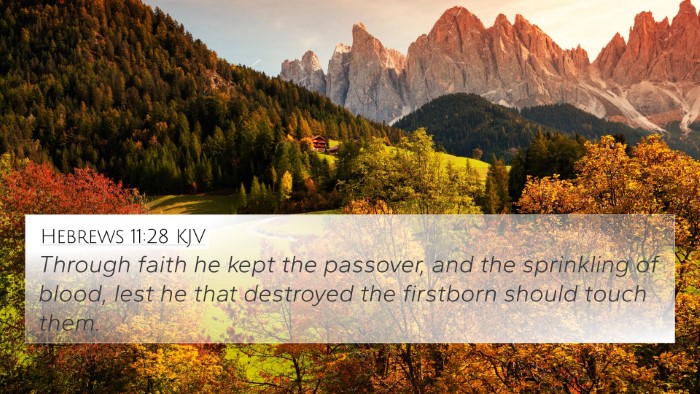Understanding Exodus 12:28
Exodus 12:28 states: "And the children of Israel went away, and did as the LORD had commanded Moses and Aaron, so did they." This verse marks a pivotal moment in the narrative of the Exodus, highlighting obedience to God and His commands.
Summary of Key Themes
- The Importance of Obedience: The verse emphasizes the necessity of following God's instructions. The Israelites' compliance showcases their faith and willingness to trust God's plan, crucial elements in their deliverance from Egypt.
- Divine Authority: This moment reinforces the authority that God holds over His people, as they act on the directive given through Moses and Aaron.
- Collective Action: The verse signifies communal obedience, showing how the entire community of Israel adhered to God's command which was essential for the Passover's institution.
Commentary Insights
Matthew Henry's Commentary: Henry elaborates on this passage, noting that the Israelites' obedience was not merely about ritual practice but a manifestation of their faith in God's protective promises. He draws attention to how their actions were pivotal for their safety during the Passover.
Albert Barnes' Notes: Barnes stresses that the successful execution of God's command led to their eventual liberation. He points out the significance of their obedience as a prerequisite for the divine intervention that followed during the Exodus.
Adam Clarke's Commentary: Clarke provides a historical context, explaining the implications of the Israelites' obedience in light of their previous bondage and suffering. He highlights the transformative nature of their actions and God’s faithfulness in fulfilling the covenant promises.
Connection to Other Scripture
Exodus 12:28 can be linked to several Bible verses that further amplify its message:
- Hebrews 11:28: "By faith he kept the Passover and sprinkled the blood, lest he who destroyed the firstborn should touch them." This verse connects to the faith exhibited by the Israelites during the Passover.
- Deuteronomy 6:24: "And the LORD commanded us to observe all these statutes, to fear the LORD our God, for our good always, that He might preserve us alive." This reinforces the underlying theme of obedience for protection and blessing.
- 1 Peter 1:2: "Elect according to the foreknowledge of God the Father, in sanctification of the Spirit, for obedience and sprinkling of the blood of Jesus Christ." This ties the obedience seen in Exodus to the New Testament doctrine of salvation through faith and obedience.
- Romans 6:16: "Do you not know that to whom you present yourselves slaves to obey, you are that one’s slaves whom you obey?" This reflects how the obedience to God in Exodus portrays servitude to righteousness.
- John 14:15: "If you love Me, keep My commandments." This emphasizes that genuine love for God is manifested through obedience.
- Psalm 103:20: "Bless the LORD, you His angels, who excel in strength, who do His word, heeding the voice of His word!" It speaks to the reverence and response to God’s commands which is echoed in Exodus 12:28.
- Acts 7:36: "He led them out, performing wonders and signs in the land of Egypt and in the Red Sea and in the wilderness for forty years." This reflects the miraculous acts that followed due to Israel's obedience.
Thematic Connections and Analysis
This verse can be examined thematically for its connections across the Scriptures:
- Faith and Action: The interplay of belief and action is a recurring theme from the Old Testament into the New Testament, illustrating that faith often necessitates visible obedience (James 2:17).
- Deliverance: The concept of divine deliverance for those who obey is seen repeatedly, making it a foundational theme throughout the biblical narrative (Isaiah 43:2).
- Community Obedience: The idea of collective adherence to God's commands resonates throughout the Bible, from the Israelites in Exodus to the early Church (Acts 2:44-47).
Tools for Further Study
For those interested in exploring the meanings behind Exodus 12:28 and its connections to other verses, utilizing the following resources can greatly aid in understanding:
- Bible Concordance: Helps in finding cross-references and related verses.
- Bible Cross-Reference Guide: A comprehensive tool for identifying connections between Biblical texts.
- Bible Chain References: A method that outlines a series of interconnected verses across the Scripture.
- Cross-Referencing Bible Study Methods: Approaches that allow for comparative analysis of themes across different books of the Bible.
- Comprehensive Bible Cross-Reference Materials: Resources that compile numerous verses catering to specific themes or subjects.
Conclusion
Exodus 12:28 represents a significant moment in the narrative of Israel’s Exodus from Egypt, symbolizing obedience to divine command and the fulfillment of God's promises. By exploring this verse alongside related scriptures, one can gain a deeper understanding of the interconnectedness of Biblical themes and the faithfulness of God to those who obey Him.



